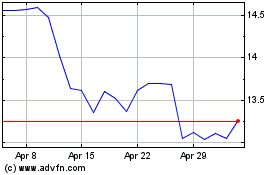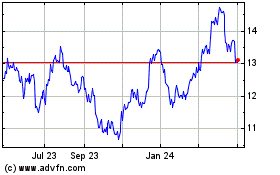BASF Raises Guidance After Weathering Supply Bottlenecks in 3Q -- Update
October 27 2021 - 7:04AM
Dow Jones News
By Ed Frankl
BASF SE on Wednesday raised its 2021 guidance after it said it
generated strong sales growth in the third quarter, despite
flagging enduring supply-chain constraints.
The German chemicals conglomerate said that despite supply
bottlenecks, it anticipates continuing solid demand, expecting
full-year sales to grow to between EUR76 billion and EUR78 billion,
from EUR74 billion to EUR77 billion under previous guidance issued
in the summer.
The Ludwigshafen-based company posted revenue of EUR19.67
billion in the three months to the end of September, a 42% jump
on-year and above analysts' expectations of EUR17.83 billion
according to estimates provided by the company.
"Sales growth was due mainly to significantly higher prices
resulting from strong demand alongside, low product availability
and increased prices for raw materials," BASF said.
Demand remained solid during the summer months and, compared
with 3Q 2020, the company increased prices by 36% and volumes by
6%, BASF said.
"The basic demand from the consumer side is good," Chief
Executive Martin Brudermueller told a press conference, adding that
there are no signs that customers are ordering less, he said.
But growth momentum slowed compared with the second quarter of
2021 because of supply-chain issues, which the company assumes will
continue to hurt the global economic recovery in the fourth
quarter, BASF said. Hurricanes in the U.S. and raw-material
shortages negatively impacted product market availability, the
company added.
The company's automotive business was especially affected by
continuing chip shortages, it said, and BASF flagged power cuts in
China as having a negative impact on production.
Pandemic-related disruptions in production and logistics in Asia
intensified the scarcity of precursors world-wide, it added.
In its bottom line, BASF swung to a net profit of 1.25 billion
euros ($1.45 billion) for the third quarter, compared with a net
loss of EUR2.12 billion a year earlier that was heavily impacted by
the coronavirus pandemic.
Earnings before interest and taxes before special items came in
at EUR1.87 billion, around EUR1.28 billion higher year-on-year,
mainly due to its chemicals segment, BASF said.
Increases in earnings at the company's materials and industrial
solutions businesses also boosted profits. But its agricultural
solutions, automotive-centric surface technologies unit and
nutrition & care business declined considerably.
That earnings mix was comparable with the second quarter, Mr.
Brudermueller said.
"Our downstream businesses are still confronted with further
rising raw material, energy and freight costs. Price increases in
most downstream businesses could only partially offset these higher
costs," he said.
However, the company upgraded its guidance for 2021 EBIT before
special items to between EUR7.5 billion and EUR8.0 billion, from
EUR7.0 billion to EUR7.5 billion beforehand.
The company also now sees full-year return on capital employed
of 13.2%-14.1%, from between 12.1% and 12.9% before, and an
increase in its accelerator business sales to between EUR21.5
billion and EUR22.5 billion, from EUR21.0 billion-EUR22.0 billion
previously.
Olaf Ridder contributed to this article
Write to Ed Frankl at edward.frankl@dowjones.com
(END) Dow Jones Newswires
October 27, 2021 06:49 ET (10:49 GMT)
Copyright (c) 2021 Dow Jones & Company, Inc.
BASF (QX) (USOTC:BASFY)
Historical Stock Chart
From Apr 2024 to May 2024

BASF (QX) (USOTC:BASFY)
Historical Stock Chart
From May 2023 to May 2024
